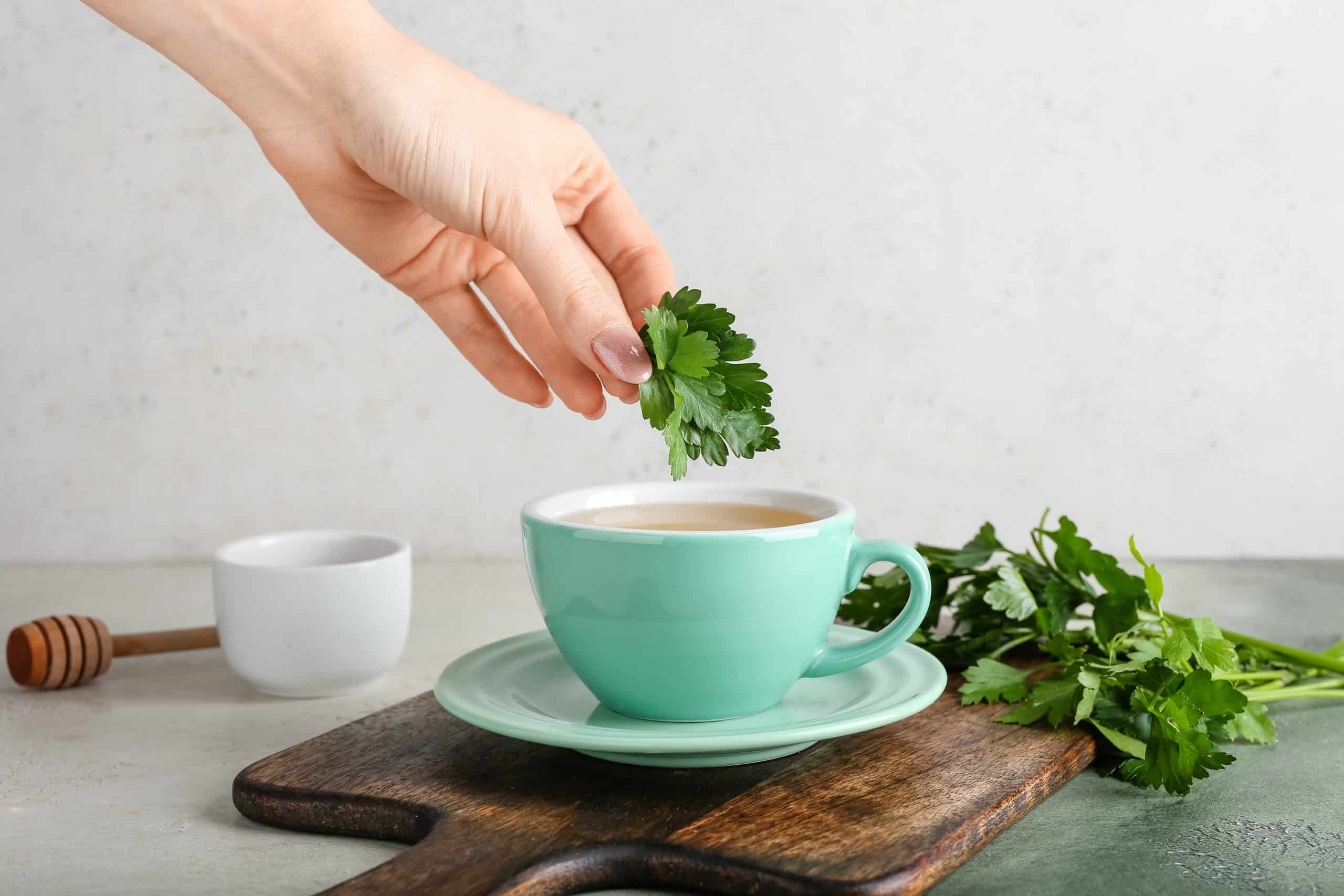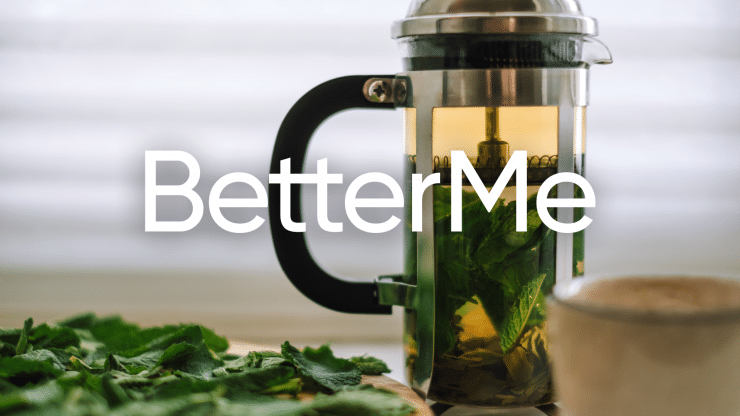The most common use of parsley is as a garnish, adding a splash of vibrant green hue to our dishes. Yet, this humble herb holds a secret – when brewed into a tea it transforms into a potent elixir that may have numerous health benefits. Rich in vitamins A, C, and K, as well as antioxidants and flavonoids, parsley tea can provide natural support to your immune system, aid in digestion, and even support heart health. However, as with all good things, moderation is key. Excessive consumption could lead to certain side effects, such as anemia or kidney problems. But fear not, this article will guide you through the benefits and potential side effects of parsley tea, along with a simple yet delicious recipe to try at home. Prepare to uncover the hidden wonders of this often-overlooked herb and make it a staple in your wellness routine.
Get your personalized
meal plan!
What Is Parsley?
Parsley is a flowering plant native to the Mediterranean region. It’s widely cultivated as a herb, spice, and vegetable.
There are two main types of parsley: curly leaf parsley and flat leaf (Italian) parsley. Both types are used in cooking for their distinct flavors and as a garnish.
Apart from its culinary uses, parsley is also known for its possible medicinal properties due to its high levels of vitamins and antioxidants.
What Is Parsley Tea Good For?
Parsley tea is packed with vitamins and antioxidants, making it a powerful drink for boosting your health. Studies have shown that parsley may:
Support Immune Function
Parsley is rich in Vitamin C, a powerful antioxidant that plays a crucial role in supporting immune function. Vitamin C aids in the production of collagen, which helps maintain the health of the skin, blood vessels, tendons, ligaments, and bones – all barriers against harmful pathogens (14).
In addition, this vitamin functions as an antioxidant in white blood cells, the body’s primary defense against infections (14).
Act As A Diuretic
Parsley tea is often drank for its possible diuretic properties (3).
A natural diuretic helps increase urine output, thereby flushing out excess fluid and waste from your body. This can be beneficial for your kidneys, as it assists them in eliminating waste and prevents fluid retention, which may help reduce bloating or blood pressure (3).
Furthermore, by promoting urine output, parsley tea may help prevent kidney stones, a condition that occurs when waste products crystallize in the kidneys (3).
Read More: 7 Benefits of an All-Meat Diet You Need to Know
Protect Heart Health
Parsley tea is a good source of folate, a B vitamin that is thought to play a critical role in heart health (10).
Folate helps maintain the health of the cardiovascular system by reducing circulating levels of homocysteine, an amino acid that can damage blood vessels. By controlling homocysteine levels, parsley tea may help prevent heart diseases and promote overall heart health (6).
Support Bone Health
Parsley is a rich source of Vitamin K, an essential nutrient for bone health. Vitamin K plays a crucial role in the production of certain proteins that are needed for bone mineralization (15). Therefore, incorporating parsley into your diet might be beneficial for your bones.
Provide Antioxidants
The high antioxidant content in parsley, particularly flavonoids and carotenoids, may help protect your cells from damage caused by free radicals (2).
Free radicals are unstable molecules that can cause oxidative stress, contributing to the development of chronic diseases such as heart disease, cancer, and diabetes. By neutralizing these harmful molecules, antioxidants in parsley may enhance your overall health and wellness (12).
Improve Skin Health
With a high content of vitamins A and C, parsley can do wonders for your skin. Vitamin A promotes healthy skin cell turnover, helping to keep your skin soft, smooth, and youthful (1).
On the other hand, Vitamin C aids in collagen synthesis, which is vital for skin elasticity and firmness (14).
Additionally, the antioxidants in parsley may help combat skin aging by fighting against free radical damage (12). So, drinking parsley tea might just be the secret to achieving that radiant glow.
Regulate Blood Sugar Levels
Some animal studies have suggested that parsley extract may reduce blood sugar levels, however, more research in humans is needed.
Reduce Inflammation
Parsley is packed with antioxidants such as flavonoids, carotenoids, and Vitamin C, which are known to have potent anti-inflammatory effects (12).
Chronic inflammation is linked to many serious diseases, including heart disease, cancer, and autoimmune disorders (12).
Looking for a way to break the vicious cycle of weight loss and tone up all the jiggly parts? Watch the extra pounds fly off and your muscles firm up with the BetterMe app!
Does Parsley Work For Weight Loss?
Parsley tea is often touted as a weight loss aid, and while it may not directly cause you to shed pounds, it is sometimes used for a temporary effect due to its diuretic properties.
The tea may help your body eliminate excess water and reduce bloating, which can make you feel lighter and more comfortable. However, it’s important to note that this is a temporary effect and not related to actual fat loss.
It’s important to keep in mind that drinking parsley tea alone won’t result in significant weight loss. Weight loss requires a comprehensive strategy that includes a balanced diet and regular physical activity. While parsley tea might make you feel temporarily lighter by getting rid of excess fluid, it’s not a magic bullet for weight loss.
How To Make Parsley Tea?
Making parsley tea from leaves is a straightforward and simple process. Here’s a step-by-step guide:
Step 1: Choose Your Parsley
You can use either fresh or dried parsley leaves. If you’re using fresh parsley, rinse about 1/4 cup of leaves under cool water to remove any dirt or debris. If you’re choosing dried parsley, measure out approximately 1 teaspoon.
Step 2: Prepare Your Tea Vessel
This could be a mug, a teapot, or even a French press. If you’re using fresh parsley, chop the leaves into smaller pieces to release more flavor.
Step 3: Place The Parsley Into Your Tea Vessel
If you’re using a tea infuser or mesh strainer, put the parsley inside it before placing it in the vessel.
Step 4: Boil Water
Once the water reaches a boil, pour it over the parsley. The amount of water you use will depend on how strong you want your tea to be, but a general rule is about one cup of water per serving of tea.
Step 5: Let The Tea Steep
This means allowing it to sit and infuse for a while. A good starting point is 5 minutes, but you can let it steep longer if you prefer a stronger flavor.
Step 6: After Steeping, Remove The Parsley Leaves Or The Infuser From The Tea
Your parsley tea is now ready to enjoy! You can add sweeteners like honey or lemon juice to taste if you wish.
Remember, the strength and flavor of your tea can vary based on how long you steep it and the amount of parsley you use. Feel free to experiment with these variables to create a tea that suits your preference.
Read More: 7 Low-Fat, High-Protein Snacks to Keep You Full and Focused
Is It Ok To Drink Parsley Tea Everyday?
Talk to your doctor, but it is generally okay for most healthy people to drink parsley tea every day in the short term. Parsley tea is rich in antioxidants, a good source of vitamin C, and may have other benefits r (11).
However, like with any food or drink, moderation is key.
Consuming large amounts of parsley may lead to adverse effects such as dehydration, anemia, liver, or kidney problems (9). Eating parsley in typical amounts is likely safe, as is using it for medicinal purposes in the short term, but talk to your doctor about your individual situation.
In addition, parsley tea or parsley in large, medicinal amounts is contraindicated for pregnant women because it might stimulate uterine contractions or increase the risk of birth defects. People who are allergic to parsley should also avoid it, as it could cause allergic skin reactions (9).
If you tend to let yourself off the hook, raise the white flag when things get tougher than you expected, send yourself on an unconscious binge-eating trip – BetterMe app is here to help you leave all of these sabotaging habits in the past!
Frequently Asked Questions
What Is The Best Time To Drink Parsley Tea?
There is no best time to drink parsley tea, but keep in mind that it can have a diuretic effect so you may not want to drink it just before bed.
It’s also advisable to drink enough water throughout the day to avoid dehydration.
Does Parsley Burn Belly Fat?
Parsley itself does not burn fat.
However, it can support weight loss and a healthy diet due to its low calorie content and high nutrient density. It adds flavor and nutrients to food without adding many calories.
Does Parsley Affect Estrogen?
Parsley contains a compound called apigenin, which some research suggests may be able to bind to estrogen receptors (8).
However, the impact of parsley consumption on estrogen activity in humans isn’t fully understood and more research is needed. As with any dietary concerns, it’s always best to consult with a healthcare provider.
The Bottom Line
Parsley tea is a nutrient-dense, low-calorie beverage that can serve as a useful addition to a balanced diet. While it may offer several health benefits such as providing vitamins, antioxidants, and acting as a diuretic, moderation is key to avoid potential side effects.
DISCLAIMER:
This article is intended for general informational purposes only and does not serve to address individual circumstances. It is not a substitute for professional advice or help and should not be relied on for making any kind of decision-making. Any action taken as a direct or indirect result of the information in this article is entirely at your own risk and is your sole responsibility.
BetterMe, its content staff, and its medical advisors accept no responsibility for inaccuracies, errors, misstatements, inconsistencies, or omissions and specifically disclaim any liability, loss or risk, personal, professional or otherwise, which may be incurred as a consequence, directly or indirectly, of the use and/or application of any content.
You should always seek the advice of your physician or other qualified health provider with any questions you may have regarding a medical condition or your specific situation. Never disregard professional medical advice or delay seeking it because of BetterMe content. If you suspect or think you may have a medical emergency, call your doctor.
SOURCES:
- Bioactive Compounds for Skin Health: A Review (2021, nih.gov)
- Dietary fiber: Essential for a healthy diet (2022, mayoclinic.org)
- Diuretic effect and mechanism of action of parsley (2002, pubmed.gov)
- Enhancing Health Benefits through Chlorophylls and Chlorophyll-Rich Agro-Food: A Comprehensive Review (2023, mdpi.com)
- Evaluation of the Anti-Diabetic Activity of Some Common Herbs and Spices: Providing New Insights with Inverse Virtual Screening (2019, nih.gov)
- Folates and Cardiovascular Disease (2002, ahajournals.org)
- Health benefits of dietary fiber (2009, pubmed.gov)
- Herbs as a Source for the Treatment of Polycystic Ovarian Syndrome: A Systematic Review (2023, nih.gov)
- Parsley – Uses, Side Effects, and More (n.d., webmd.com)
- Parsley Health Benefits, Uses And Its Side Effects (2020, lybrate.com)
- Parsley: a review of ethnopharmacology, phytochemistry and biological activities (2013, pubmed.gov)
- Petroselinum crispum has antioxidant properties, protects against DNA damage and inhibits proliferation and migration of cancer cells (2015, nih.gov)
- Prevention and Treatment of Flatulence From a Traditional Persian Medicine Perspective (2016, nih.gov)
- Vitamin C (2021, nih.gov)
- Vitamin K (2021, nih.gov)











